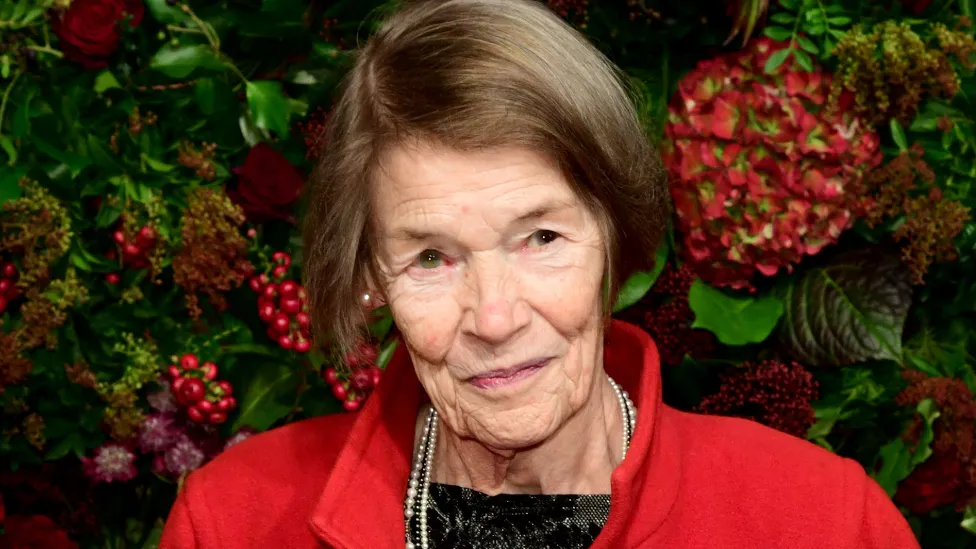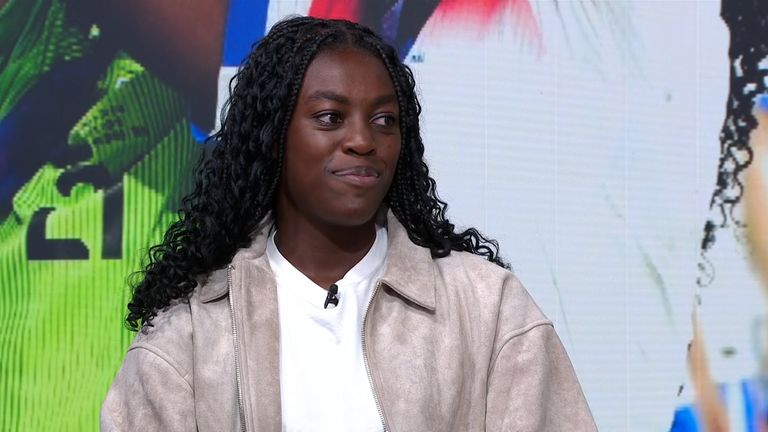Glenda Jackson: Oscar-winning actress and former MP dies aged 87
Sir Michael Caine has described actress and former MP Glenda Jackson as "one of our greatest movie actresses" following her death aged 87.

Jackson won two Oscars, three Emmys, two Baftas and a Tony in an acting career which spanned six decades.
Sir Jonathan Pryce said he believed she was "the greatest actor that this country has ever produced".
Jackson gave up acting to join the House of Commons as a Labour MP in north London from 1992 to 2015.
That included two years as a junior transport minister in Tony Blair's New Labour government from 1997.
She later returned to acting, playing King Lear on stage in 2016, then winning a Bafta for her screen comeback in the TV drama Elizabeth Is Missing in 2020.
In a statement on Thursday, her agent Lionel Larner said: "Glenda Jackson, two-time Academy Award-winning actress and politician, died peacefully at her home in Blackheath, London this morning after a brief illness with her family at her side.
"She recently completed filming The Great Escaper in which she co-starred with Michael Caine."
Sir Michael first acted with Jackson in 1975. Following their recent reunion, he said: "It was as wonderful an experience this time as it was 50 years ago. I shall miss her."
Other tributes were paid from across the worlds of the arts and politics.
Labour MP Tulip Siddiq, who now sits in Jackson's former seat, tweeted: "Devastated to hear that my predecessor Glenda Jackson has died.
"A formidable politician, an amazing actress and a very supportive mentor to me. Hampstead and Kilburn will miss you Glenda."
Shadow culture secretary Lucy Powell, who worked for Jackson before becoming an MP herself, recalled the "incredibly kind" politician's "cutting humour" and "general disdain at most things".
"She was the definition of an icon, successfully spanning the world of acting and politics with great aplomb," Powell wrote.
Broadcaster and former Conservative MP Gyles Brandreth said she was "a wonderful actress, a committed politician [and] a remarkable human being".
"We became MPs on the same day in 1992 & I treasure our unlikely friendship," he wrote. "She was such a gifted, caring & special person who came into the world to make a difference - and did."
A spokesman for Prime Minister Rishi Sunak said it was "extremely sad news", adding: "His thoughts will be with her friends and family at this time."
TV presenter Carol Vorderman said: "To see this unique woman turn into a firebrand in politics was deeply impressive for young girls like me. May she rest in peace."
Jackson began acting after joining an amateur dramatics group as a teen while working in Boots near her tome town of Birkenhead in Merseyside.
She won a scholarship to the Royal Academy of Dramatic Arts (Rada) in London, and joined the Royal Shakespeare Company (RSC) in 1963.
After making her name on stage, she won her first Oscar for playing a headstrong artist in director Ken Russell's film of DH Lawrence's novel Women in Love.
Her second Academy Award came three years later for A Touch of Class, a romantic comedy in which she played a fashion designer caught up in a catastrophic love affair with a US businessman.
She did not attend either ceremony, though, saying she was busy.
"All awards are very nice to have," she told BBC Radio 4's This Cultural Life last year. "But they don't make you any better."
The role in A Touch of Class came about after she famously showed off her comedy skills in a guest appearance as Cleopatra on Eric Morecambe and Ernie Wise's hit Saturday night TV show.
"I've always said, and I mean it, they were the apotheosis of my career, working with them," she told BBC Radio 4's Desert Island Discs.
She also played the Egyptian queen - more seriously - on stage in Shakespeare's Antony and Cleopatra for the RSC.
Sir Jonathan, who was also in that production, told BBC Radio Wales: "Everyone will talk about her tremendous strength and courage and intelligence, [and] her wit.
"I worked with her twice in the 70s, and she was always direct, always honest. And, like the greatest art, her work was simple and uncluttered."
'Tour de force'
In its tribute, the RSC described her as "a tour de force in acting and politics, dedicating her life to both".
The company added: "We're proud her extraordinary talent was seen on RSC stages early in her career in ground-breaking productions."
Jackson played Elizabeth I in BBC drama Elizabeth R - another role she famously revisited - winning Emmys for both Elizabeth R and also playing the queen opposite Dame Vanessa Redgrave in 1971 film Mary, Queen of Scots.
Further Oscar nominations came her way for portraying a frustrated office worker in a love triangle in 1971's Sunday Bloody Sunday, and for taking the title role in 1975's Hedda, adapted from Henrik Ibsen's Hedda Gabler.
Labour MP Chris Bryant, who wrote a biography of Jackson in 1999, told BBC Radio 4's The World At One: "She had such versatility.
"It's the quality of the work, and the variety. Her voice could go to gravel to caramel in three seconds."
Former Labour MP Baroness Hoey told BBC Radio 5 Live: "When she came into Parliament, she was so modest. She never wanted to be reminded that she was an actress."
Other credits included playing English poet Stevie Smith in Stevie, and as Hollywood icon Patricia Neal in The Patricia Neal Story.
A staunch Labour supporter, she was approached to stand for Parliament - and said she agreed because she disliked former Prime Minister Margaret Thatcher and the "destruction that her policies has had on human beings".
There was a link between acting and politics, she said.
"The best theatre is about trying to find and tell the truth," she told Desert Island Discs. "It's not about covering up. It's not about playing games. It's not about hiding. It's not about pretending you're something you're not.
"It's trying to find what it is to be a human being and why we behave towards each other in the ways that we do. And I think that the best politics is trying to find the truth as well."
-bbc







